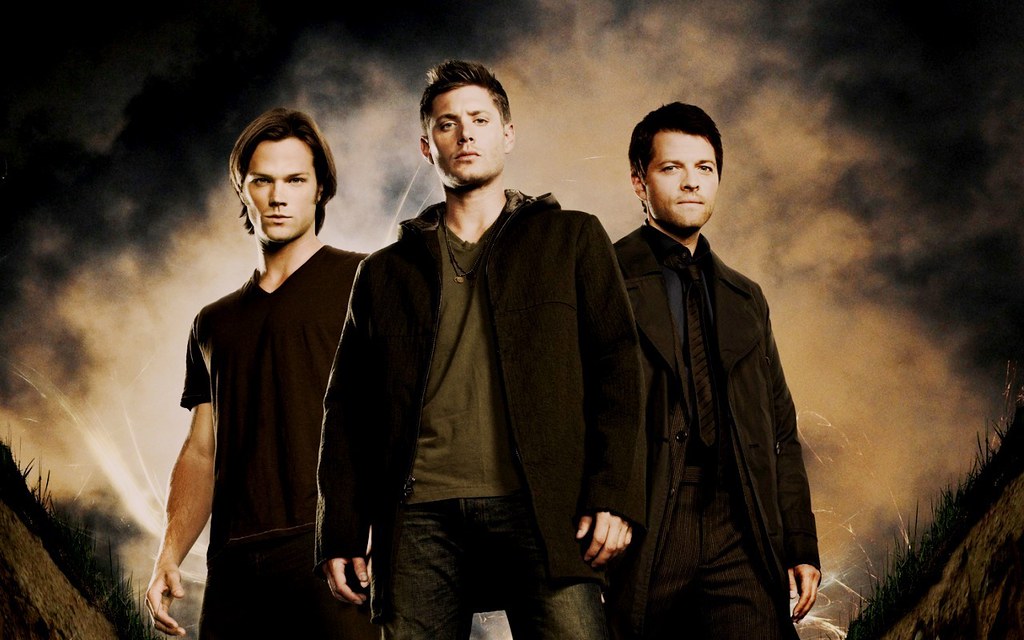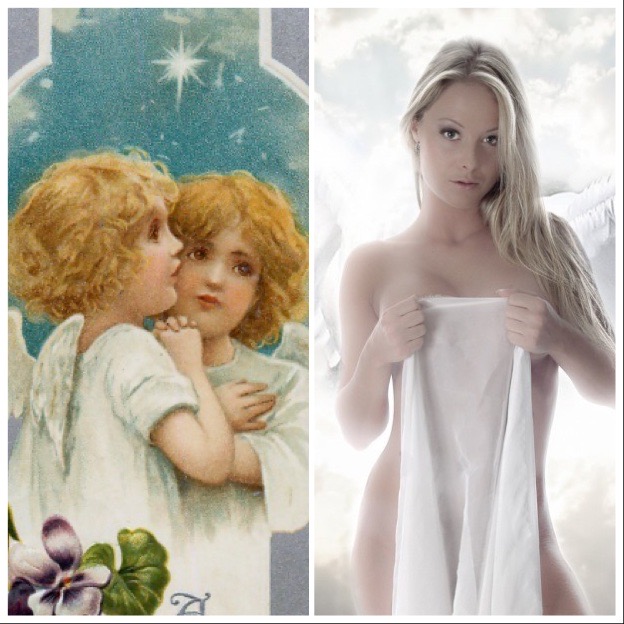
Thanks to my sons, I have come late to a recent popular TV show that dealt with angels, demons, and the occult, namely “Supernatural”. I have seen reviewers describe the show as underwear models fighting demons, and that makes me chuckle. I am tempted to join the Christian responses of either avoiding it as clearly heretical, or dismissing it with a wave of the hand and saying something along the lines of, “it’s just fantasy; enjoy it and don’t think too hard.” However, thanks to fielding questions about demons and angels, and for the benefit of my sons, I will engage with some of the ideas raised by “Supernatural”.
First, I will credit some things that the show gets “right” according to hints from the Bible. In contrast to popular images of angels as beautiful women with harps, or frivolous babies with wings, the show’s portrayal of angels as powerful warriors of grim determination are, in my view, an improvement.

Biblical angels are supernatural beings of power, spiritual in nature and therefore generally invisible to mortal eyes; but they are able to take human form. As an example, men in white were seen at the tomb of Jesus to announce his resurrection, and also on the hilltop after his ascension. The writer of Hebrews furthermore advises Christians:
“Do not neglect to show hospitality to strangers, for thereby some have entertained angels unawares.”
Examples of angels appearing as men from the Old Testament would include the two men who visited Lot prior to destroying Sodom and Gomorrah in Genesis 19.
In the majority of the biblical passages that deal with angels, they are performing the role of emissary or spokesperson, sent from God. The very word “angel” (ἄγγελος or angelos ) means “messenger”. But they also are also engaged in executing God’s judgement upon unrighteous people, and in protecting God’s people.
As in the TV show, the Bible also speaks of angels as being engaged in warfare. For example, in Revelation 17, we get this information from the apocalyptic vision of St. John:
“Now war arose in heaven, Michael and his angels fighting against the dragon. And the dragon and his angels fought back, but he was defeated, and there was no longer any place for them in heaven. And the great dragon was thrown down, that ancient serpent, who is called the devil and Satan, the deceiver of the whole world—he was thrown down to the earth, and his angels were thrown down with him.”
The Bible speaks of archangels, who are leaders or “princes” among the angelic host. Two are mentioned by name, Gabriel and Michael. The Book of Daniel mentions Michael twice. In chapter 10 an unnamed angel visits Daniel, and tells him that he was delayed:
“The prince of the kingdom of Persia withstood me twenty-one days, but Michael, one of the chief princes, came to help me, for I was left there with the kings of Persia”
From Chapter 12 of Daniel:
“At that time shall arise Michael, the great prince who has charge of your people. And there shall be a time of trouble, such as never has been since there was a nation till that time. But at that time your people shall be delivered, everyone whose name shall be found written in the book.”
Gabriel says this of himself in Luke chapter 1:
“And the angel answered him, ‘I am Gabriel. I stand in the presence of God, and I was sent to speak to you and to bring you this good news’.”
As in the show, angels can fall away and betray God. In the New Testament , the books of Jude, and 2 Peter have nearly identical passages regarding fallen angels being imprisoned. From Jude:
“And the angels who did not stay within their own position of authority, but left their proper dwelling, he has kept in eternal chains under gloomy darkness until the judgment of the great day.”
This brings me now to things the show gets terribly wrong. In many aspects of its portrayal of angels and demons, “Supernatural” becomes either downright asinine, or simply blasphemous. Time will not allow me to list all of the sins of this show. I will gloss over the silliness involving ancient Greek gods and goddesses, Hindu deities and the like—from a Christian perspective these are not real. I will also set aside the tendency of secular media to mangle the Christian apocalypse, a topic that both fascinates and is woefully misunderstood. The show furthermore has an almost medieval fascination with relics, Latin incantations, holy water, and amulets.
The series depicts angels possessing humans, much like demons do, and using them as “meat suits” or “vessels”. This is not really Biblical.
Furthermore, in “Supernatural” even the “good” angels are portrayed as being clueless at best (Castiel) and more often as total jerks (Gabriel and Raphael), and not always much better than the demons they fight.
In fact, sometimes Sam and Dean must try to kill angels in order to protect themselves or their world from annihilation. An undercurrent of dualism becomes ever more prominent in later seasons. Rather than good being superior to evil, and evil needing to be vanquished, the idea is that good and evil are merely opposite forces that are both needed for balance, like the Chinese Yin and Yang.
In Christian theology this would be foolishness. St Thomas Aquinas described evil as privation. As one writer describes it, “Evil is not some thing in its own right – like some kind of dark seeping ooze that invades goodness and destroys it. No, evil is not a “thing” at all, but the falling-short, an emptiness or non-functioning, in something else.“ (Dr. Joseph Magee, “Saint Thomas Aquinas and the Problem of Evil”, online at https://aquinasonline.com/problem-of-evil/)
I find it quite interesting that a show dealing with angels and demons in every episode is nonetheless simultaneously very nearly devoid of God. The angels are usually portrayed as agnostics who lament that their “Father is absent” and wonder whether God even exists. This is in stark contrast to the biblical depictions of angels as being in the presence of God. (When God does finally appear in “Supernatural” he is a limited being, bearing little relation to the God of Christianity–This could be a subject for a different essay).
Even harder to find than God is any trace of the Son of God. The series has an “Antichrist” but no “Christ”. Jesus is mostly a nonentity in “Supernatural”. In an episode in season 6, a diabolical being named “Eve” tells a Christian truck driver “you do know that Jesus was just a man” before brutally killing him. Of course, in Christianity, Jesus is more than just a man. He is at the center of it all. He is the God-man who after triumphing over death and evil, has been exalted to the heavenly throne, to “the right hand of God”, where he is surrounded by hosts of angels.
Jesus tells his disciples in John 1:51, “Truly, truly, I say to you, you will see heaven opened, and the angels of God ascending and descending on the Son of Man.”
The final role for angels listed in the Bible is that of choir. As in the old hymn, “Crown Him with Many Crowns”, the heavenly anthem of the angels ultimately will drown out all other music, including the cacophony of this world. In Revelation 5, John has the vision of an innumerable throng of angels “numbering thousands upon thousands, and ten thousand times ten thousand” encircling the throne and singing songs of praise to Jesus. Let us now take up their anthem:
“Worthy is the Lamb who was slain, to receive power and wealth and wisdom and might and honor and glory and blessing!”



